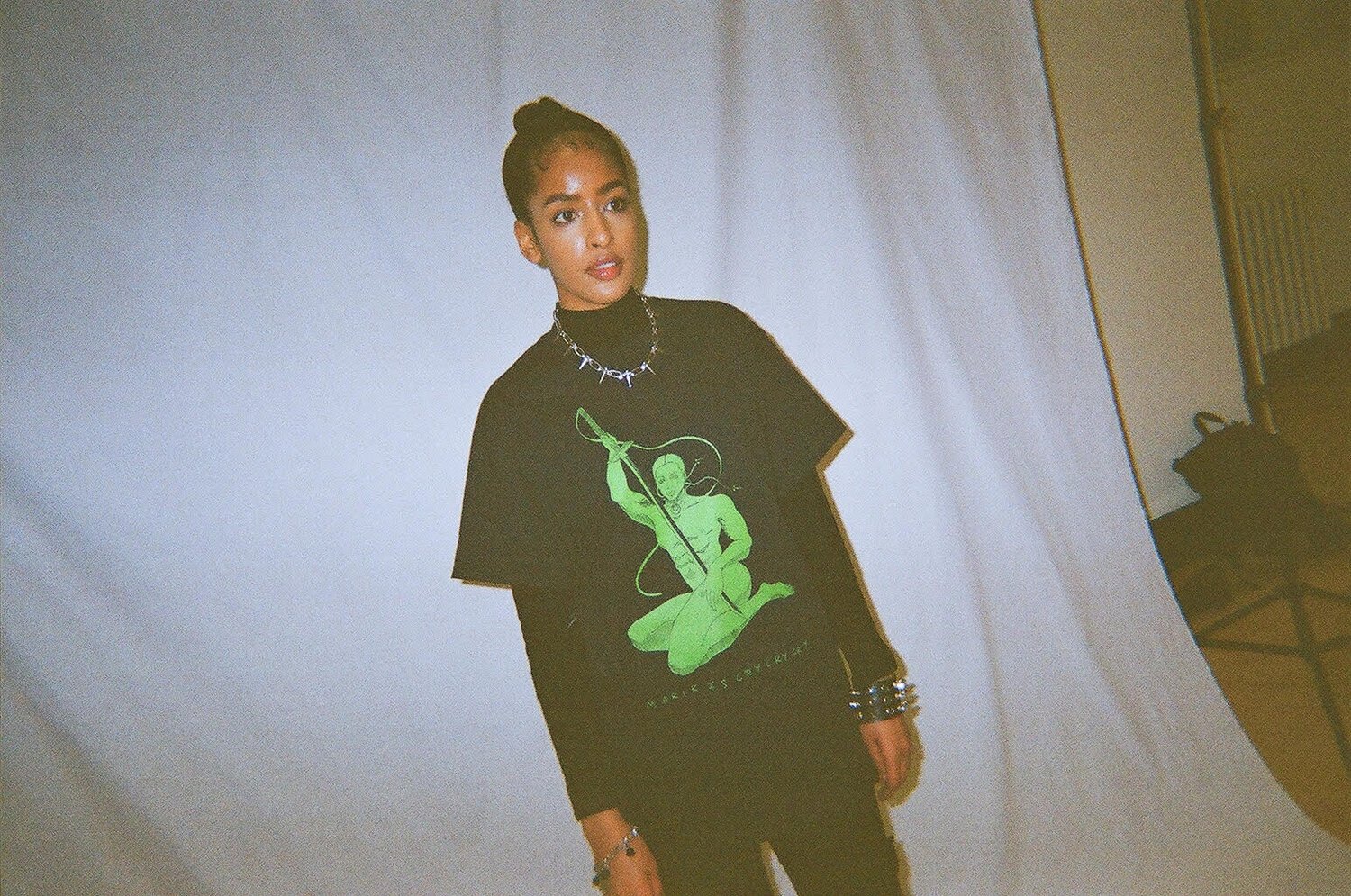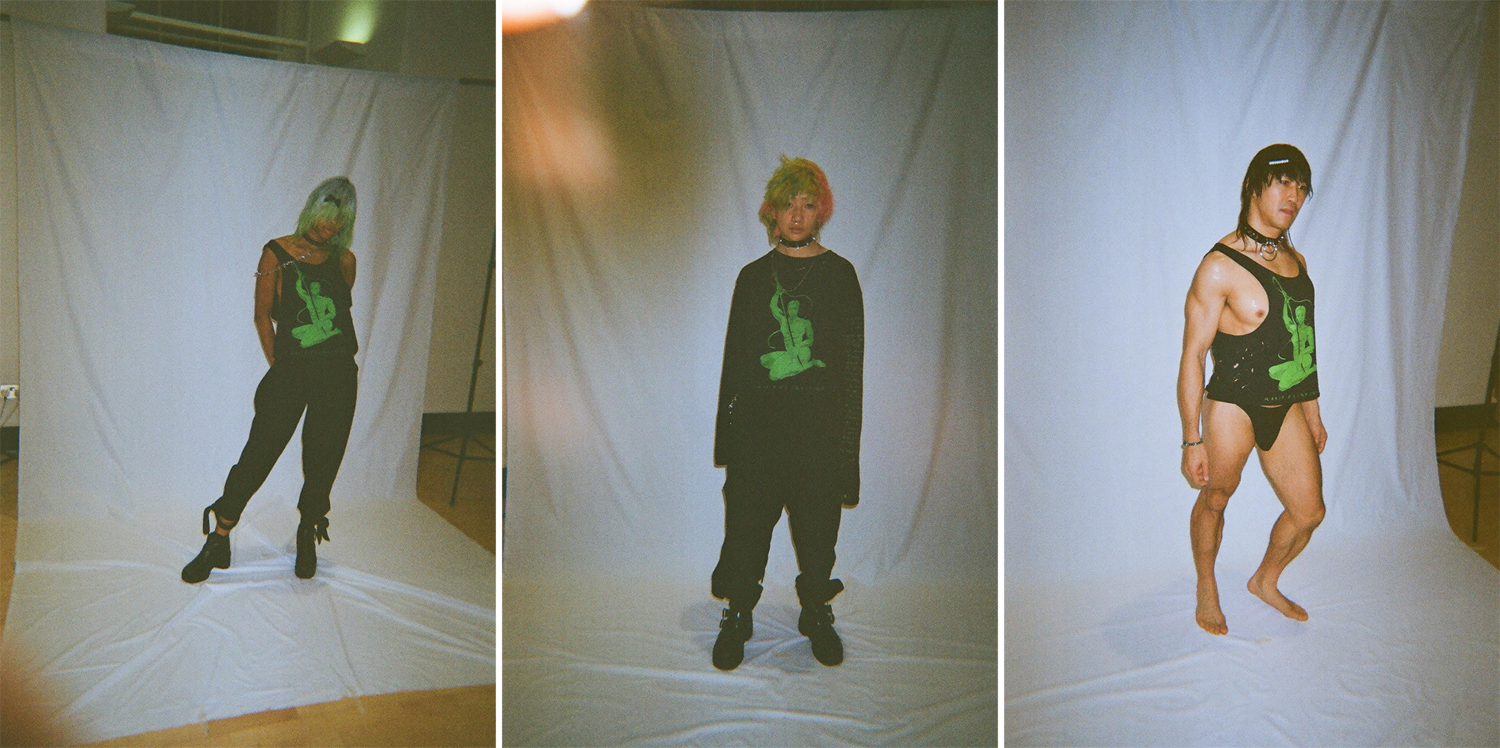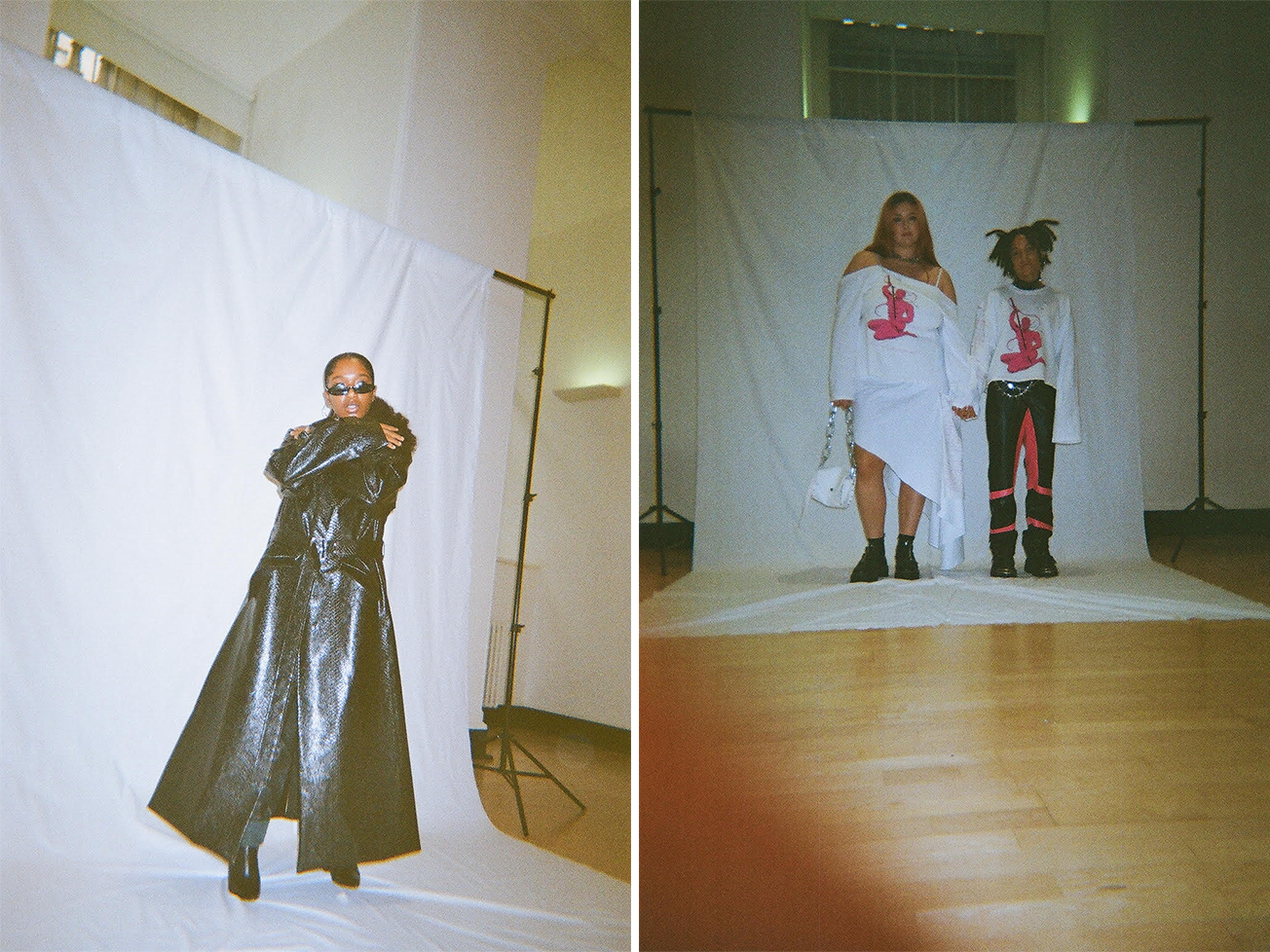How to Be Authentic to Yourself, with Malik Nashad Sharpe and Chidera Eggerue
Make it stand out
Choreographer and creative Malik Nashad Sharpe has utilised lockdown to create MISS ME ERODE, a mini collection of clothing with a pointed non-binary view that looks to take on traditional fashion’s binaries. Designed by Sam Ray, the line itself is modelled on 3D avatars that are emblematic of how Sharpe sees themselves in the world, or rather, how they see themselves operating outside of the white, patriarchal world we all exist within.
Sitting down to speak with Chidera Eggerue - award winning author and activist - the pair tear apart not just what it means to break boundaries of race and gender, but what it even means to be a human being. The following transcription has been edited for clarity and length but the message rings true throughout: There’s no better person to be than yourself.
___STEADY_PAYWALL___
Chidera: So MISS ME ERODE, do you feel like you are in a state of erosion?
Malik: I named the collection MISS ME ERODE because I was thinking about the erosion of old principles or like, ways of doing things, ways of being because this year obviously has shifted so much in our lives. And instead of making that fatal or because usually erosion is maybe not the most positive word, my whole thing is to always shift these terms, and make them productive rather than just immediately bad. So I was like, okay, do I feel in a state of erosion? Maybe, but it's not necessarily a bad thing. It can be a thing that can be used to make something visionary.
Chidera: I feel like the word erode stood out to me because I kind of see us all, human beings, as rocks, and when you think about rocks on a beach, they become pebbles, because they've all bumped into each other and they've kind of eroded each other.
I feel like we're all weirdly eroding each other and with each time we bump into each other, or interact with each other, there's a change that happens and by the time that our time on this earth finishes, we're all smooth pebbles instead of bumpy rocks that we were at the beginning.
With fashion, it's a way of inventing yourself and curating yourself. I think with this collection, what I really like about it is the non-binary-ness of it all. Even if you're not a non-binary person, it allows you to feel free in choosing what you want to wear. When I was on the website, the actual shopping experience was my favorite part.
Malik: I love that.
Chidera: I feel like the avatars subliminally reflect this idea that we're all avatars and we're all literally made up. This might be complicated but I hope it lands, you know the saying - 'If a tree falls in the forest, and no one's around to hear it, did the tree fall?' - Well technically, yes. See how human consciousness is only created by us? Technically, we don't exist outside of ourselves because we only exist within our own consciousness. So we're like the tree that fell and no one's there to hear us. Based on the idea that we don't exist unless other people are there to witness our existence, then that is what kind of gives me the freedom to just be myself and do want while I'm here, because technically, I don't exist. So what's the point? I'm just an avatar.
Malik: To make yourself in a way that is in your control or, like, something that you do as a practice even. To make oneself because existence is so personal and so personally related, no one knows how you see any one thing or experience any one thing, your existence is so personal. Why not just make yourself into the things you want to make yourself into on any given day?
For me, that’s my whole vibe. I have always hated boxes. I've never been someone who's interested in assimilation or anything like that, it's not for me. It's so related to being non-binary and just trying to live outside of the terms that are ascribed to you without your consent. No one even asked me, 'Do you want to be that?', you know?
'This thing that we call you, even though we don't know anything about you because your existence is you'. You don't even ask me. So, I can't with that, actually. Because where's my room for me to make myself in that? There's no room.
Chidera: How do you create room now to make yourself? Or is there room to make yourself?
Malik: It's difficult: I think, and sometimes I wonder, am I actually doing that when I try to style myself in the day. Because usually I work with performance and I feel like performance is one of those ways where I was trying to kind of assert my own subjectivity, my own autonomy, and be like, this is a means that you can't experience elsewhere or in another way.
Obviously now, all those spaces are closed, you can't really perform in public, galleries are closed too. So I’m thinking, can clothes be a way of doing that? And I thought, yeah, actually, because it's not that far off from performance. We always are performing. It's everywhere. It's all the time. We make ourselves go into the world and people witness us. That's a performance right there in itself.
Chidera: It's strange because clothes for me have always been something that has either brought violence my way or protected me from violence, and I think as I get older, I start to enjoy being able to know that I can protect myself, regardless of what violence will come my way.
Malik: Clothes are so intimate and it's the first thing you do in the day. You get up and follow this ritual, you get up, you put on some clothes. Unless you're a nudist. Then when you go outside and if you are met with violence because of the things that you wear, it's really intense, it's actually even more intense because you put them on, they are intimate, and it's there to make yourself and then you go out and then people encounter that self with violence, and then you're just like, ‘What the fuck?’
Chidera: It just makes you want to stay at home all the time. Do you have an avatar version of yourself? Or are you the avatar version of yourself?
Malik: Put that ‘blows head emoji’ (🤯) literally like times 10, that's my response. I definitely think that I am kind of like an avatar of this world. Everything is so constructed, we live in such a constructed life, you know? Like building structures, everything is constructed. That doesn't feel very dissimilar to me to a digital world or a digital fabric where there's an avatar experience that we can see.
In a way, I have an avatar of this experience and the way that I approach, even my style, or just my look, is very influenced by that. I'm not trying to be, I don't know, some bland ass thing, I'm trying to just making myself.
Chidera: What do you love the most about being yourself?
Malik: I love that I'm just super into not being assimilated. I really, really think that I've never ever assimilated. I've always been weird. I've always been the person who's just the weird one and kind of fine with it. Even if people were trying to bully you into being like something that they want you to be, I didn’t let it shake me because I don't ever want to be someone else's fantasy. I want to be my own fantasy.
Chidera: Mood! That's how I feel. I would consider myself grey asexual. So for those who don't know what that means, grey asexual is you're asexual, but you're still somewhat a participant in the whole, like, wanting to be with other people, type of thing. And for me, my biggest fantasy is myself.
That's when I realised that I was asexual, when I found myself more attracted to myself and other people, and I used to feel weird for it. I used to feel like, ‘Is it bad to like yourself this much? Or does it make you self absorbed?’
But I think in a way, being asexual has actually saved me from so much mess and manic decisions that people make when it comes to love and affection and needing validation outside of yourself. I think it always circles back to the avatar concept of when you're in love of yourself, especially in asexual way, you see yourself as the avatar that you've created of yourself and you constantly get to make those changes. Just like in a video game, when you're deciding to change your avatars earrings, or eye shape, just randomly mid game.
I really wish people the freedom of being able to be your own fantasy, because I think people who are their own fantasy are attractive because they're not trying to be attractive to other people.
Malik: Freedom is such a good word to use, because it really is about freedom and freedom is desirable. It's alluring.
We all want to be free, as free as we can be in a world where it's very obvious that we don't have the freedoms that we are being told that we have. There are many ways that we get policed into being certain things that are not who we are.
When you say about being asexual, you were saying ‘am I weird for liking myself’, and there's nothing weird about that. It's only because there's an assimilationist pressure in the world to be heterosexual and patriarchal.
Those are systems that were created by humans to police other humans.
Chidera: Especially black humans.
Malik: Especially black humans. And I'm like, ‘Listen, as long as I'm black, as I always will be in this world, I'm not gonna do that.’ I'm just not gonna do that because I will get my freedom.
And you will not take that from me like, like listen, do not put me in a box of your own fantasy. I'm living my own fantasy.
Chidera: I think for me, especially as a living avatar, is that like, avatars don't die. As long as the console is connected to a power source, that's the avatar forever. And in seeing myself as an avatar, even when I'm not here anymore, I still won't die because my ideas and my view of the world continue to live on in other people's random passing thoughts or in other people's ways of seeing themselves. That, for me, is what keeps me excited and looking forward to continuing my life as a self made avatar.
Malik: Literally, same. And that's on that, because it's about freedom and it's about the power source, that's so important.
Chidera: What's your power source?
Malik: Oh my God, so many things. I would say sounds, I would say dancing, I would say blackness, I would say queerness, I would say living outside of people's boxes that they try to put me into, in all of these things give me that energy, give me that boost to be like, ‘You know what? I'm gonna do me in this because me is all that I got.’ I’ve got to take care of that. I got to fuel that. I got to make sure that that can exist, because it's not a given. It's really not a given in this world.
Chidera: My power source is in knowing that I was put on this earth specifically to change and to transform and I have to trust that my transformation is necessary, and I have to trust that my method of transformation is the right way to transform. Like, I didn't come into this world with tattoos, and now I have loads of tattoos. I didn't come into this world with these ideas, but now I have these ideas, and I know that in five years time, I'm going to be such a different person, and I am excited to meet that person. My power source remains being disobedient and defiant and trusting that those who change the world, change themselves first.
Malik: Exactly, because that's where it comes from. Where else could it come from? And as you say, we have been put on this earth to change, that is literally what it means to be human beings.
Chidera: That analogy earlier at the beginning of this conversation sums it up: We all came in as rocks and we're gonna leave us pebbles, because we've all smashed into each other.
Malik: Exactly. Just shifting and changing and becoming new things. And that's on that.
Chidera: And that's on that!
MISS ME ERODE is available to shop here and you can follow Malik Nashad Sharpe here. You can also follow Chidera Eggerue here.



